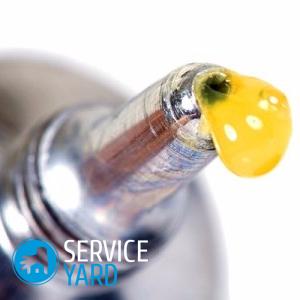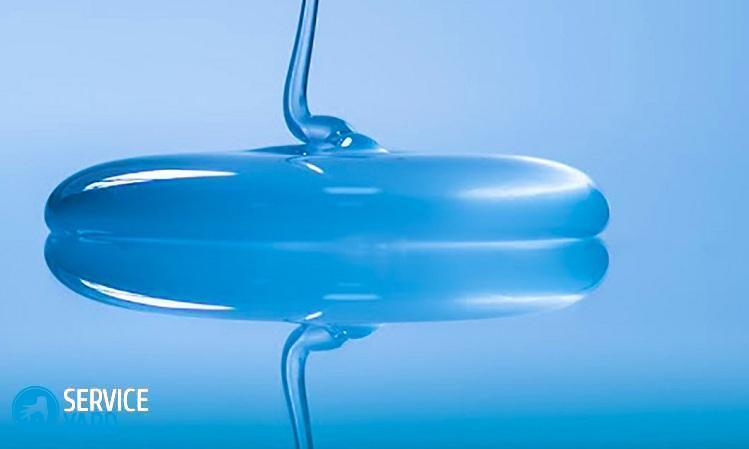Office glue liquid glass

In modern construction, silicate glue is quite actively used, in other words, liquid glass. In fact, this is a mineral compound, which, in addition to the construction industry, is widely used in the national economy and household for gluing materials of various nature. In this article we will try as much as possible to talk about what clerical glue “liquid glass” is, we will describe the features of its production and use.
to contents ↑How is liquid glass made?
For the first time, clerical glue was made in Germany in 1818 by the chemist and mineralologist von Fuchs. Today, this material is produced using a variety of technologies.
The most common ones are:
- Tripoli, diatomites, flasks or other varieties of siliceous raw materials are placed in special alkaline solutions, where they dissolve at ordinary pressure and relatively low temperatures.
- Compounds containing silicon are treated with concentrated sodium hydroxide. Perform this procedure on a special autoclave.
- Quartz sand and soda are fused for construction work.
Silicate glue (water glass) is sold as a ready-to-use solution or in dry form, resembles a powder that must be diluted with water in certain proportions. Instructions are attached to each composition, which clearly describes how and in what proportions to dilute it:
- In everyday life, of course, it is better to use a prepared solution.
- Industrial, construction enterprises often order this product dry.
Important! The main indicator of the chemical composition of this adhesive is the silicate module, the value of which indicates the release of silica into the solution. In addition, this module describes the ratio of sodium or potassium oxide to silicon oxide contained in silicate glue. But note that the quality of the glass is not determined by this indicator.
Glass dries at natural and elevated temperatures. As a rule, manufacturers, in order to accelerate this process, finished products are dried at a temperature of 375 degrees. The adhesive dissolves completely in water, no sediment or particles remain. If ketones, salt compounds, aldehydes, ammonia, alcohol-containing substances are added to the solution, then a salting-out effect can be observed.
to contents ↑Important! This material is incompatible with organic compounds, the only exception is sugar, alcohol, urea.
The main characteristics of stationery glue
Solutions of this liquid compound include various arrogant forms, simple orthosilicates from the category of monomers. The key characteristics of this composition are the following.
Polymerization
The level of polymerization of silicate glue is not constant, it constantly changes under the influence of fluctuations in the ratio of silicic acid and alkali. In addition, this indicator depends on the concentration characterizing the basic substance.
Viscose
This is an essential indicator of the quality of water glass. This value decreases with increasing temperature, precisely at the level at which the material is made. With an increase in the concentration of the solution, its viscosity increases. The value of this value is determined using a special device - a viscometer.
Important! It can also increase if a highly soluble salt is added to the glass.
Density
This indicator is measured by an ordinary aerometer. It most accurately indicates the real density of the composition, even if too little glue is given for analysis. This value is measured with fluctuations, even the most insignificant, of the ratio of the silicic acid and alkaline component of the glass.
Brewing point
The astringent properties of the adhesive directly depend on it, that is, the liquefaction temperature, ranging from 760 to 870 degrees.
PH value
Strongly change this indicator is impossible. If you add 10-100 parts of water to the composition, then the pH level will change no more than one unit, that is, it will become 10-12. Glue hardening occurs at a temperature from minus 2 to plus 10 degrees. It returns to its initial state upon dilution, but its properties remain unchanged.
to contents ↑Important! Do not store clerical glue (liquid glass) at subzero temperatures; otherwise, crystals may form on its surface. Even after warming up, they do not disappear.
Water glass application
The largest consumers of this material are construction enterprises. Most often it is used in concrete:
- Despite the fact that it is characterized by a low price, with its help it is possible to significantly improve the quality, operational properties of concrete, guarantee a high level of waterproofing to the solution.
- The material has high antibacterial properties. Due to this, the concrete with which it is mixed is never covered with fungus or mold. All modern pools, structures that work at high humidity, are concreted with compositions containing silicate glue.
Important! The glass freezes quickly enough, so it’s better not to risk it, do not mix it with concrete mortar before starting work.
Liquid glass in the fight against subsidence of buildings is pumped directly into the ground under the base of the building. This happens in two ways:
- Instantaneous method. The mixture is formed from liquid glass and a special hardener, then it is fed directly under the building.
- Sequential way. First, the glass is pumped, only then the hardener.
Other options:
- Impregnation of wood and plaster with liquid glass is very common in construction.
- Silicate paint is diluted with them, which provides excellent protection against corrosion of metal products for 25-30 years.
- Silicate glue is part of modern particleboard. Such impregnation makes any wooden product durable, resistant to compression.
Areas of use for silicate glue
Impregnation of concrete and plastered surfaces with silicate mortar guarantees an excellent antiseptic effect. Any coatings become more resistant to the aggressive influence of external factors - high humidity and flue gases. Now it’s clear why glue “liquid glass” is so popular in many areas. The use of this composition gives coatings treated with additional properties:
- High hardness.
- Abrasion resistance.
- The ability to clog various cracks and bumps that appear in plaster or concrete.
In addition, liquid glass is used in the production of:
- Tile adhesive.
- Refractory, water-resistant paints for wooden products.
- Cement acid resistant mixtures.
- Putty for cast iron pipes.
- Welding electrodes.
- Solutions for cleaning oil machines.
- Adhesive formulations for cellulose products.
Stock footage
In the household field, silicate glue, liquid glass has been used by gardeners for the treatment of tree trunks for many years. Today, it is being replaced by more modern substances for caring for various plants. But, despite this, most gardeners still prefer it is time-tested, inexpensive silicate glue.
- How to choose a vacuum cleaner taking into account the characteristics of the house and coatings?
- What to look for when choosing a water delivery
- How to quickly create comfort at home - tips for housewives
- How to choose the perfect TV - useful tips
- What to look for when choosing blinds
- What should be running shoes?
- What useful things can you buy in a hardware store
- Iphone 11 pro max review
- Than iPhone is better than Android smartphones




